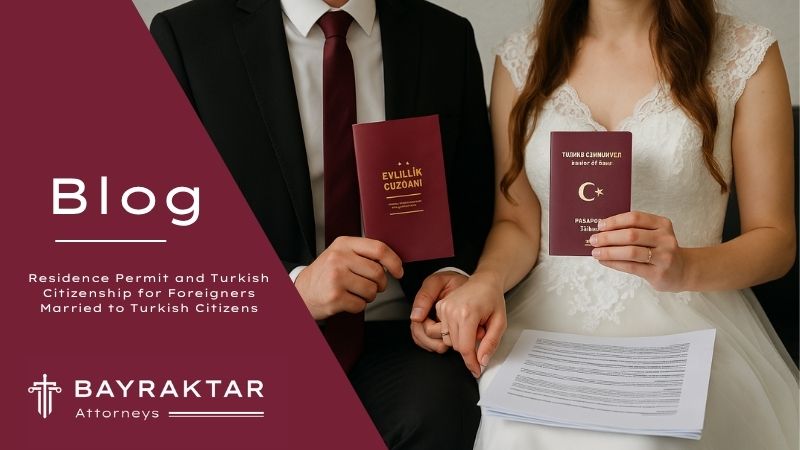
Many foreign nationals living in or married to someone from Türkiye often ask: Can I file for divorce in Türkiye? and What happens to our jointly owned property, especially real estate located in Türkiye? These are important legal questions, especially in international marriages where property division laws can vary drastically. This blog will explain the legal procedures for foreigners filing for divorce in Türkiye, but most importantly, it will emphasize how Turkish real property law applies regardless of the couple’s nationality.
Can Foreign Nationals Divorce in Türkiye?
Yes. Foreigners can file for divorce in Türkiye, and in many cases, Turkish courts are competent to handle such proceedings. Whether one or both spouses are foreign nationals, Türkiye allows foreign citizens to access its legal system, provided certain jurisdictional requirements are met.
Even if a couple lives abroad, Turkish citizens living overseas may file for divorce in Türkiye. If neither spouse resides in Türkiye, then the competent court is determined by the last place of residence in Türkiye. If there is no such residence, the case may be filed in Ankara, Istanbul, or İzmir courts.
For example, a Turkish citizen living in Germany may file for divorce in Türkiye without residing in Türkiye, and if their last known address in Türkiye was Istanbul, then an Istanbul court may have jurisdiction.
What About When Both Spouses Are Foreign?
Even if both spouses are foreigners, Turkish courts can still have jurisdiction if one of the spouses has legal residence or substantial ties to Türkiye. Under the International Private and Procedural Law (MÖHUK), divorce between two foreigners may be heard by a Turkish court if one of the parties has a residence permit or established domicile in Türkiye.
In such cases, Turkish procedural law applies to court proceedings, even if the underlying substantive law is determined by the nationality or shared domicile of the couple.
Which Court Is Authorized to Hear the Case?
The Turkish Civil Code and Civil Procedure Law (HMK) establish clear jurisdictional rules. A divorce lawsuit may be filed in the family court located at:
The current residence of either spouse, or
The last shared residence of the couple within the past six months.
If both spouses reside outside Türkiye, the plaintiff can file in major cities such as Ankara, Istanbul, or İzmir, unless a more specific place is established by previous residence or property ties.
Foreigners and Real Property in Divorce Cases
This is where things get especially important for international couples: Regardless of nationality, if the couple owns real estate in Türkiye, Turkish law applies to the division of those properties. Even if both spouses are foreign, or one is a Turkish citizen and the other is not, immovable properties located within Türkiye are subject to Turkish law during divorce proceedings.
In other words, if either spouse purchased a house, land, or commercial real estate during the marriage—even if it is registered in just one spouse’s name—the other spouse has the right to demand their legal share under Turkish marital property rules (unless a special marital regime was agreed to, such as separation of property).
Important Court Decision on Residency of Foreigners
The Turkish Court of Cassation (Yargıtay) has held that even foreigners who do not have a residence permit may still be considered as residing in Türkiye for legal purposes if they can demonstrate clear intent to establish life in Türkiye. In a landmark ruling (Yargıtay 2. Hukuk Dairesi 2010/4537 E, 2011/8105 K), the court emphasized that subjective intention (to settle) and objective reality (actual long-term presence) together determine residency status.
Moreover, courts can ask the Turkish General Directorate of Population and Citizenship whether the foreigner is listed in the foreigners' registry and whether an official address was declared. These factors affect whether the Turkish courts are authorized to hear the case.
Retaining Turkish Citizenship After Divorce
It is also important to note that if a foreign couple obtained Turkish citizenship through investment together, such as by purchasing real estate or making a capital deposit, their citizenship status will not be affected by a subsequent divorce. In other words, once both spouses have acquired Turkish citizenship and completed the required retention period (typically three years), they will each retain their citizenship independently, even after the marriage ends. The divorce has no retroactive effect on the citizenship process, and Turkish authorities do not revoke citizenship based solely on the end of a marital relationship.
Final Notes
Foreigners seeking divorce in Türkiye should be aware of the following key points:
Turkish courts apply Turkish procedural law, regardless of the nationality of the parties.
Real estate located in Türkiye is always governed by Turkish law, even if the owners are foreigners.
If you do not contest jurisdiction early in the proceedings, you may be considered to have accepted Turkish jurisdiction.
In many cases, foreign spouses may benefit from consulting with an attorney who understands both Turkish family law and international legal implications.
At Bayraktar Attorneys, we regularly assist international clients with divorce, asset protection, and post-marital property settlement issues in Türkiye. Whether you are the spouse of a Turkish citizen or a foreign couple with property in Türkiye, we can help you navigate the complex legal system with clarity and confidence.







